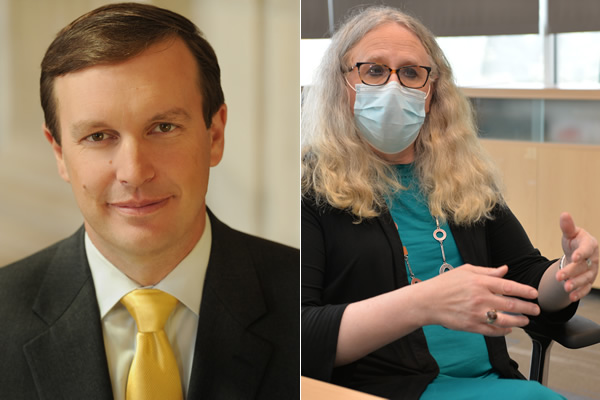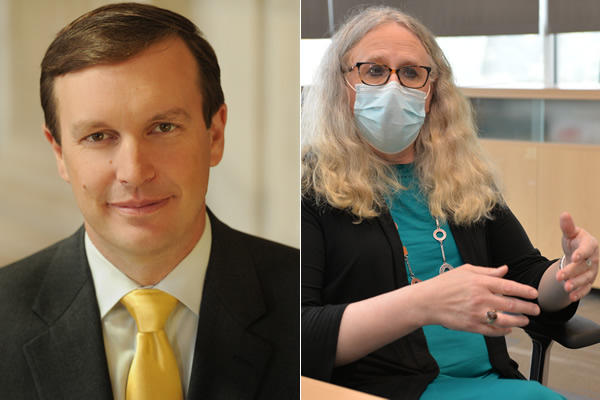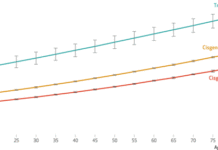
With the new term for the U.S. Supreme Court underway, justices for the first time in years won’t have to consider a major case specifically impacting LGBTQ rights, which legal advocates say will lead to them to focus their attention on high-profile cases that challenge a woman’s right to access abortion.
At the top of the watch list for court, which now has 6-3 conservative majority as a result of appointments under former President Trump, is Dobbs v. Jackson Women’s Health Organization, which will determine the constitutionality of the Mississippi law banning abortion after 15 weeks and is widely considered a direct challenge to long-standing precedent established by Roe v. Wade guaranteeing a right to abortion. The Texas law banning any abortion after six weeks, which the Supreme Court allowed to take effect as litigation against it proceeds, is still pending in lower courts, but will likely reach the high court soon.
For many LGBTQ legal advocates, the abortion cases are important because they say the outcome could directly impact legal precedent underpinning major Supreme Court decisions in favor, including the 2003 decision of Lawrence v. Texas, which struck down state bans on sodomy, and the 2015 decision of Obergefell v. Hodges in favor of same-sex marriage nationwide.
Camilla Taylor, director of constitutional litigation for Lambda Legal, said the outcome abortion cases is crucial not only because LGBTQ people need access to abortion.
“Just as importantly, there are a lot of ways in which the landmark precedents that we obtained that vindicate the rights of LGBT people rely upon a foundation of substantive due process precedent that includes Roe v. Wade, and other cases dealing with reproductive health,” Taylor said. “So, if Roe versus Wade crumbles, then the foundation on which our own cases also crumbles.”
As such, a coalition of LGBTQ legal groups—including the National Center for Lesbian Rights, the National Center for Transgender Equality and Equality California—was among those who filed a friend-of-the-court brief in September arguing the Mississippi law is unconstitutional.
Key among the arguments is the denial of abortion access is a form of sex discrimination, just as the Supreme Court determined last year in Bostock v. Clayton County that anti-LGBTQ discrimination is a form of sex discrimination, this illegal under the Civil Rights Act of 1964.
“By the same logic, laws that restrict abortion also facially discriminate based on sex,” the brief says, “Like being LGBTQ, pregnancy is a sex-based characteristic; it is ‘inextricably bound up with’ an individual’s sex. Accordingly, laws that force a pregnant woman to bear a child necessarily discriminate based on sex, as would a law that barred a reproductive medical procedure available only to men.”
It’s true that both Roe v. Wade and the Supreme Court’s decision for LGBTQ were based on principals of due process and equal protection under the 5th and 14th Amendments of the U.S. Constitution. But not all legal experts agree LGBTQ rights are on the line depending on the outcome of abortion litigation.
Dale Carpenter, a conservative law professor at the SMU (Southern Methodist University) Dedman School of Law who’s written in favor of LGBTQ rights, said the Supreme Court is “probably going to write a narrower opinion, if it even overrules Roe,” but won’t issue a radical decision “that reaches out and destroys all unenumerated rights.”
“Obergefell relies on the fundamental right to marry,” Carpenter said. “There’s no chance the Supreme Court is going to say there is no right to a fundamental right to marry. The doctrine upon which Obergefell rests is on much more solid footing than abortion rights. The basic doctrine underlying Obergefell has never seriously been challenged; abortion rights have been for 50 years.”
Other key differences between the right to abortion and same-sex marriage, Carpenter said, are an arguable state interest in protecting fetal life and reliance interests in the case of marriage rights given thousands of same-sex couples have wed in the wake of the Obergefell decision.
But what about Lawrence v. Texas, which were both that LGBTQ rights decision and Roe v. Wade decided at least in part on finding an unenumerated right to privacy in the constitution? Carpenter said a Supreme Court decision undoing a right to privacy would mean undoing nearly 60-year precedent that began with the 1965 decision in Griswold v. Connecticut, which overturned a state ban on contraceptives.
“There’s not even a single brief in the case, that I know of, on the anti-abortion side that’s supporting that,” Carpenter said.
Carpenter concluded with a wry jab: “By the way, the LGBT rights advocates who are now saying that these LGBT rights decisions are in danger will be the same people say after Roe is a overruled that those decisions are not affected.”
Indeed, the Supreme Court under its current 6-3 conservative makeup had an opportunity to take up an Indiana birth certificate case, Box v. Henderson, that was a direct challenge to the Obergefell marriage decision, but declined to take up the case. No state is any where close to recriminalizing sexual relations for same-sex couples, which in 2021 would widely be seen as a human rights violation.
But legal advocates for the LGBTQ community aren’t limiting the relationship between abortion and LGBTQ rights to legal principles. Additionally, the identify solidarity with another minority group under siege, in this case women seeking access to abortion, and need among certain members of the LGBTQ community—lesbian and bisexual women, transgender men and non-binary people—to have the access to abortion.
Shannon Minter, legal director for the National Center for Lesbian Rights, echoed the sense LGBTQ legal advocates are focused on abortion cases, but cited “overlap between the reproductive rights, and justice movement and the LGBTQ movements.”
“What we see is the primary impact of this case on our community is a very direct one,” Minter said. “It’s extremely direct. The ability to obtain abortions is of great importance to women in our community, and also to transgender men and non-binary people as well.”
Minter cited data finding upwards of 80 percent of bisexual women will experience pregnancy over their lives and said LGBTQ women “are significantly more likely to have unintended pregnancies as a result of sexual violence, which is very distressing, but that is a reality for our community.”
Lesbian young adults and adolescents are at particular risk for unwanted pregnancy, Minter added, because there’s still “so much stigma and discrimination that they tried to sort of hide their sexual orientation, and prove that they’re straight when they’re not, so they actually have high rates of unprotected sex.”
Religious schools funding, gun control, Obamacare on docket
The abortion cases aren’t the only litigation on the radar for LGBTQ legal advocates. Also on the list are cases that will determine whether Maine religious schools have access to public funds, the legality of New York State gun regulations and disparate impact claims under Obamacare.
Taylor said the case of CVS Pharmacy v. Doe before the Supreme Court, which was brought by people living with HIV/AIDS, will determine whether disparate impact claims are cognizable in the context of disabilities under the Affordable Care Act.
“That’s really important for people living with HIV and other people with disabilities,” Taylor said. “It could do a lot of harm.”
The oral arguments in the Dobbs case are set to take place before the Supreme Court on Dec. 1.








